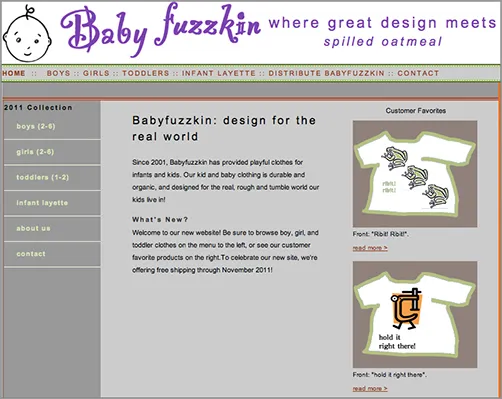![]()
Part I
Foundation
So, you want to differentiate your website from the millions of others out there on the Internet? Great! Let’s get started! Whether you’re starting from scratch or just looking for a new approach, the hardest part of embarking on a search engine optimization (SEO) campaign is knowing where to begin. In Part I, we walk you through a little self-reflection and search engine basics to lay the groundwork for Your SEO Plan:
Chapter 1 Clarify Your Goals
Chapter 2 Customize Your Approach
Chapter 3 Eternal Truths of SEO
Chapter 4 How the Search Engines Work Right Now
![]()
Chapter 1
Clarify Your Goals
A good SEO campaign needs to be laser-focused on your business goals, so it has to start with a healthy dose of thought and reflection. In this chapter, we’ll walk you through the key questions you’ll want to consider before you get started.
Chapter Contents
- What Is SEO?
- Do I Need to Perform SEO for My Website?
- What Are the Overall Goals of My Business?
- What Function Does My Website Serve?
- How Is My Website Connecting with the Goals of My Business?
- Who Do I Want to Visit My Website?
- What Do I Want Visitors to Do on My Website?
- Which Pages Do I Most Want My Website Visitors to See?
- How Will I Measure the Success of This SEO Campaign?
What Is SEO?
OK, let’s see a show of hands: How many of you are reading this book because you want a #1 rank in Google? Yeah, we thought so. As SEO consultants, we know how good it feels when your website makes it to the top of the heap. Listen, we sincerely hope you get your #1 Google rank, but it won’t help you if it’s bringing in the wrong audience or pointing them to a dead-end website. So don’t think of SEO as just a way to improve your site’s ranking.
The term search engine optimization describes a diverse set of activities that you can perform to increase the number of desirable visitors who come to your website via search engines (you may also have heard these activities called search engine marketing or search marketing). This includes things you do to your site itself, such as making changes to your text and HTML code. It also includes using specially formatted text or documents to communicate directly with the search engines, or pursuing other sources of traffic by creating listings or attracting links. Tracking, research, and competitive review are also part of the SEO package.
SEO is not advertising, although it may include an advertising component. It is not public relations (PR), although it includes monitoring your reputation and crafting your branding similar to PR. As a continually evolving area of online marketing, SEO may sound complicated, but it is very simple in its fundamental goal: gaining targeted visitors.
Do I Need to Perform SEO for My Website?
It may seem like a no-brainer, but actually, the answer is not necessarily yes. If any of the following examples apply to you, you may not be in need of an SEO campaign right now:
- You have a website that you really don’t want strangers to find, such as a training tool for your employees or a classroom tool for your students.
- Your site is already ranking well, you’re satisfied with your sales, and you don’t want to rock the boat.
- You’re in a big hurry—say, you’ll go out of business without a major upswing in revenue in the next couple of months. This is not to say that SEO can’t help you, but good SEO takes time. You may need to focus your energies elsewhere right now.
If this list doesn’t apply to you, we think you’re ready to begin your SEO adventure!
What’s Your Excuse?
We often encounter people who offer the following reasons not to do SEO:
“I don’t have enough money.” If you don’t have any money in your budget for SEO, simply follow our plan with a focus on organic (that means low-cost or no-cost!) optimization. Believe it or not, you can make substantial improvements without spending a dime.
“I don’t have enough time.” SEO is a very flexible process. If you don’t have an hour a day, use whatever time you do have and work through the plan over a longer period. Be sure to look at Chapter 10, “Extra Credit and Guilt-Free Slacking,” for advice.
“My website stinks!” Don’t give up! This is a very common problem for folks setting out on an SEO campaign. If everybody waited until their site was perfect before doing SEO, nobody would do SEO. This book will give you some practical workarounds for your situation.
It is a rare site indeed that couldn’t use a little improvement in the SEO department. Solid SEO is a prerequisite for a successful website these days, so if you don’t need it today, it’s a good bet you’ll need to brush up your SEO smarts for tomorrow. So even if you don’t think you need SEO right now, we recommend that you take the time to work through the questions in this chapter and make sure your goals aren’t begging for a little help.
What Are the Overall Goals of My Business?
We get it: The fundamental goal of your business is to make money by selling a product or service. But let’s take a moment to define your goals in a little more detail.
Perhaps yours is a large company with branding as an important long-term goal. Maybe your company wants to make money with certain products but is willing to take a loss in other areas. Maybe you are starting up with investor backing and don’t need to turn a profit for years. Perhaps your company’s branding and reputation is your top concern—you need to be perceived as high tech, or luxurious, or as the hippest in your competitive space. Or maybe you work for a nonprofit, with a goal to improve the world and inspire others to do the same. You may be working toward 2,000 small sales this year or be thrilled to get just 3 new clients. Whatever way you’re leaning, your business goals will affect your SEO campaign strategy.
For instance, consider the fictional situation of Jason, a founding partner at Babyfuzzkin, a company selling unique, high-end baby clothes. This business makes its money directly through online sales. It’s a small operation, so there is a limit to how many orders the business can handle. The Babyfuzzkin fantasy would be a steady flow of, say, 100 orders per month. But there is more to the story: The partners would love to get out of the direct fulfillment of orders and instead secure some contracts with big-name brick-and-mortar vendors.
In the case of Elizabeth, a marketing director at Elderpets, we have a different situation. Elderpets is a fictional nonprofit organization that provides meals, walks, and veterinary care assistance to animals belonging to elderly and infirm owners. The company relies on financial contributions and volunteers to fulfill its mission. At Elderpets, their fantasy is to decrease the time and effort spent on fundraising activities, such as silent auctions and community dog washes, and begin attracting more contributions online, which would in turn allow them to help more pets in need. In addition, they are constantly looking for more volunteers.
Though Babyfuzzkin and Elderpets have different goals, we have an exercise they can both perform to get the most out of their SEO plan. We’ve created a Goals Worksheet to guide clients like Jason and Elizabeth, and you can use it as you consider the questions in this chapter. You can download the Goals Worksheet at our companion website, www.yourseoplan.com. At key points throughout this chapter, we’ll ask you to stop, reflect on your own business, and write down your own vital statistics. Once you’ve worked through the questions, you’ll have a strong vision of the why of your SEO campaign—and you’ll be ready to move on to the what and how in Parts II and III.
Now: Download the Goals Worksheet from www.yourseoplan.com.
Now take a moment and look at “Business Goals” on your Goals Worksheet. Table 1-1 and Table 1-2 show how Jason at Babyfuzzkin and Elizabeth at Elderpets might fill out theirs, respectively.
Table 1-1:Summary of Business Goals for Babyfuzzkin
| Sell clothes directly to consumers online. |
| Additional goal | Attract brick-and-mortar stores to sell our clothes. |
Table 1-2: Summary of Business Goals for Elderpets
| Additional goal | Attract more donations. |
| Additional goal | Attract more volunteers. |
Now: Take a few minutes to write down your overall business goals in “Business Goals” on your Goals Worksheet. Don’t be afraid to indulge in fantasy!
What Function Does My Website Serve?
It’s not uncommon to hear that the reason a company built a website is “to have a website.” While we all love a bit of circular logic before breakfast, if you’re going to put a lot of time and money into promoting your website, it’s important to have a good idea of what it’s doing for you.
Most websites are built out of a combination of basic building blocks. Whether your site is an online store seeking sales; a personal blog seeking community connections; a political or religious outlet seeking to persuade, uplift, or inspire; a corporate brochure displaying branding identity and company information; or just about any other type of website you can imagine, it will likely include some or all of the following features or elements:
| Corporate history, news, and press releases | Fun, games, or entertainment |
| Executive biographies | A strong brand identity |
| Product and service information | Art or craft portfolio |
| Online purchasing/donation | Educational materials |
| Support for existing customers, clients, and students | Information specifically for geographically local visitors |
| News and current events | Software or documents available for download |
| Articles, white papers | Media (pictures, audio, video) available for viewing/downloading |
| Religio... |




